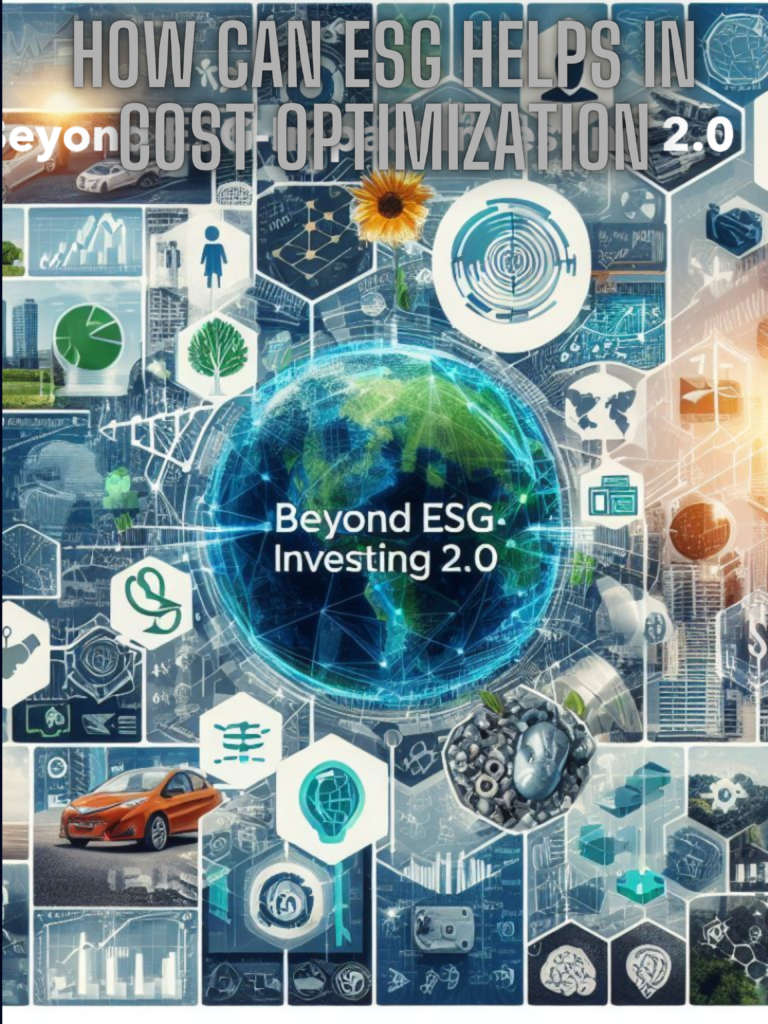Introduction
How Can ESG Helps In Cost Optimization is an important question. The Environmental, Social, and Governance (ESG) framework serves as a guide for organizations aiming to incorporate sustainability into their business operations. ESG proves beneficial by aiding organizations in cost reduction and optimizing investment and capital expenditures. Capital allocation towards sustainable opportunities can result in reduced costs and increased profitability. Moreover, ESG plays a pivotal role in fostering top-line growth by improving transparency, reducing information asymmetry, and attracting long-term investment. It also helps organizations minimize regulatory interventions by ensuring compliance with environmental laws, consequently reducing legal risks.
Additionally, ESG contributes to employee productivity by fostering engagement and retention. Creating a corporate culture embedded with sustainability, social responsibility, transparent governance, and ethical behavior is another significant outcome of ESG implementation. Here, we delve into specific ways ESG achieves these outcomes:

Cost Reduction:
ESG identifies and mitigates risks related to environmental and social factors, leading to substantial cost savings. For instance, adopting energy-efficient technologies reduces energy consumption, translating to significant cost reductions. Similarly, embracing sustainable practices decreases waste generation, thereby lowering disposal costs and enhancing overall cost-efficiency.
Optimizing Investments:
Allocating capital to sustainable opportunities, such as renewable energy projects or sustainable supply chain practices, enhances long-term financial performance and sustainability. Investing in these areas not only reduces costs but also demonstrates a commitment to environmental responsibility, attracting socially responsible investors.
Facilitating Top-line Growth: How Can ESG Helps
ESG enhances transparency, reduces corporate information asymmetry, and attracts long-term investment. Adopting sustainable practices improves brand reputation, fostering customer loyalty and increased sales. Attracting socially responsible investors further contributes to growth opportunities and improved revenue streams.
Minimizing Regulatory Interventions: How Can ESG Helps
Compliance with environmental laws and broader sustainability concerns through ESG practices helps organizations avoid legal penalties. Ethical practices, such as adhering to labor laws, contribute to a positive regulatory track record, reducing legal costs, and enhancing overall reputation.
Increasing Employee Productivity:
ESG initiatives, such as sustainable practices and providing training opportunities, improve employee morale, motivation, and skills. This, in turn, boosts operational efficiency, contributing to organizational competitiveness.

Building a Corporate Culture: How Can ESG Helps
ESG fosters a corporate culture that integrates sustainability, social responsibility, transparent governance, and ethical behavior into the company’s DNA. Adopting sustainable and ethical practices contributes to a culture of responsibility and integrity, enhancing the organization’s reputation.
Attracting Socially Responsible Investors:
Demonstrating commitment to sustainability through ESG practices attracts socially responsible investors interested in environmental and social responsibility. This enhances the organization’s access to capital and contributes to long-term sustainability.
Improving Brand Reputation:
Adopting sustainable and ethical practices under the ESG framework improves the organization’s brand reputation. Building a reputation for environmental responsibility, integrity, and transparency enhances customer loyalty and attracts socially responsible investors.
Reducing Carbon Footprint: How Can ESG Helps
ESG contributes to reducing an organization’s carbon footprint through sustainable practices, such as adopting energy-efficient technologies and sustainable waste management. This improves environmental performance and, consequently, enhances the organization’s reputation.
Building a Sustainable Supply Chain:
ESG aids in building a sustainable supply chain by adopting practices like sourcing from sustainable suppliers and embracing circular economy principles. This not only reduces costs but also improves operational efficiency and long-term sustainability.
Conclusion: How Can ESG Helps
In summary, the adoption of Environmental, Social, and Governance (ESG) principles offers organizations a transformative pathway to sustainability and long-term competitiveness. From cost reduction and optimized investments to fostering growth and building a positive corporate culture, ESG’s impact is comprehensive.
ESG not only helps organizations navigate regulatory challenges but also enhances employee productivity and attracts socially responsible investors, improving access to capital. By reducing carbon footprints and building sustainable supply chains, ESG aligns businesses with global imperatives while ensuring operational efficiency and resilience.
In essence, ESG represents a profound shift in how organizations perceive their roles, guiding them toward a future where economic success goes hand-in-hand with environmental stewardship and social responsibility.
Answer covered People also ask
How does ESG help with cost reduction?
What are the five 5 ways that ESG creates value?
Why is ESG important for Organizations?
Disclaimer
This article has been created on the basis of internal data, information available publicly, and other reliable sources to be believed. The article may also include information which are the personal views/opinions of the authors. The information includes in this article is for general, educational, and awareness purposes only and is not a full disclosure of every material fact.
All the information on this website i.e. World Virtual CFO – is published in good faith and for general information purposes only. World Virtual CFO does not make any warranties about the completeness, reliability, and accuracy of this information. These are my views for only information purposes. Any action you take upon the information you find on this website (World Virtual CFO), is strictly at your own risk. World Virtual CFO will not be liable for any losses and/or damages in connection with using our website. For details please refer to our disclaimer page.
Dr. Dinesh Sharma is an award-winning CFO and AI strategist with over two decades of experience in financial leadership, digital transformation, and business optimization. As the founder of multiple niche platforms—including WorldVirtualCFO.com—he empowers professionals and organizations with strategic insights, system structuring, and innovative tools for sustainable growth. His blogs and e-books blend precision with vision, making complex financial and technological concepts accessible and actionable.